From Doorstep to Reuse: The Good Bin Pilots in Montreal
Projects Sponsor
From old paint to worn-out shoes, Le Bon Bac makes responsible disposal as easy as leaving it outside your door. Partnering with Canadian businesses and non-profits, the service ensures materials are reused or recycled locally. By showing the sorting and transformation process online, Le Bon Bac builds trust and transparency. In spring 2025, Le Bon Bac piloted its model in Montreal’s NDG neighborhood: 125 households diverted 1,000 lbs from landfill, drawing glowing feedback, paying customers, and industry interest. Now open for business, Le Bon Bac (also registered as The Good Bin) is a scalable, community-powered solution, curbing Canada’s waste before it hits the curb.
 Le Bon Bac was launched in response to the City of Montreal’s Stratégie du Plan Directeur de Gestion des Matières Résiduelles de l’Agglomération de Montréal (PDGMR), which targets zero waste by 2030. While citizen participation is central to this strategy, several persistent challenges have historically limited its effectiveness.
Le Bon Bac was launched in response to the City of Montreal’s Stratégie du Plan Directeur de Gestion des Matières Résiduelles de l’Agglomération de Montréal (PDGMR), which targets zero waste by 2030. While citizen participation is central to this strategy, several persistent challenges have historically limited its effectiveness.
There’s a lot of confusion and misinformation around recycling. Many residents remain unclear about what materials are accepted in municipal curbside recycling. In 2018, 20% of landfill waste was actually recyclable, underscoring the need for clearer public guidance. Limited visibility into the recycling process and negative media coverage lead to public skepticism, reducing participation in recycling programs and spreading further confusion in a vicious cycle of non-recycling.
Le Bon Bac, an on-demand at-home pick-up service for materials not accepted by municipal curbside programs—such as electronic waste, batteries, paint, office supplies and more, was launched to address these issues. While Montreal serves as the pilot city the model was designed from the outset to be scalable and deployable across Canada.
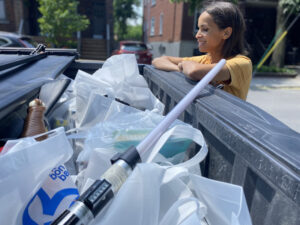 Le Bon Bac’s model cuts through the confusion and makes responsible disposal easier than just taking a bin out to the curb. Each participating household in the pilot program received clearly marked collection bags along with simple, engaging instructions explaining the team’s mission and how to participate.
Le Bon Bac’s model cuts through the confusion and makes responsible disposal easier than just taking a bin out to the curb. Each participating household in the pilot program received clearly marked collection bags along with simple, engaging instructions explaining the team’s mission and how to participate.
Over four scheduled pickups households placed filled bags of hard to recycle items like clothing, shoes, electronics, toys, and paint at their doorsteps for collection.
The Le Bon Bac logistics team ensured timely and efficient retrieval, with emissions from collection activities offset through certified Canadian carbon programs. These materials were then brought to their processing center for sorting, auditing, and treatment, before being distributed to a network of vetted partners for reuse, upcycling, or recycling. Making recycling as easy as stepping out your door took some harder behind the scenes work from Le Bon Bac.
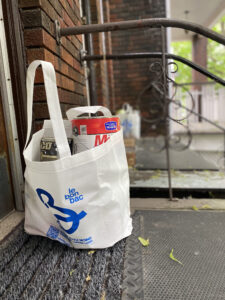 Prior to launching the pilot, they undertook a comprehensive research and validation process to ensure the service was both needed and feasible, and to lay the groundwork for national scalability.
Prior to launching the pilot, they undertook a comprehensive research and validation process to ensure the service was both needed and feasible, and to lay the groundwork for national scalability.
They conducted an in-depth market analysis to understand the gaps in existing waste management services and identify underserved household segments. A demographic and urban planning study pinpointed neighborhoods with high concentrations of their likely customers: urban households with private doorsteps, above-average income, and strong environmental values.
Twenty one-on-one interviews with Montreal residents aged 25–55, shed light on the transparency gap and lack of straightforward information would-be recyclers faced and highlighted both the high value placed on convenience (every one preferred at-home collection) and the fact that most would be open to paying $10–$15/month for the service.
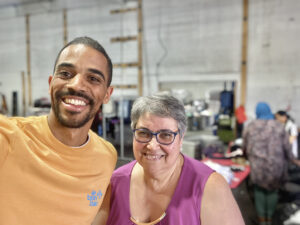 The team assessed Le Bon Bac’s offering amidst existing services, including municipal curbside collection, ecocentres, sole-material recyclers and bulk waste collectors. The analysis confirmed that Le Bon Bac fills key service gaps by offering a complementary, accessible, and transparent solution—often turning potential competitors into collaborators through strategic partnerships.
The team assessed Le Bon Bac’s offering amidst existing services, including municipal curbside collection, ecocentres, sole-material recyclers and bulk waste collectors. The analysis confirmed that Le Bon Bac fills key service gaps by offering a complementary, accessible, and transparent solution—often turning potential competitors into collaborators through strategic partnerships.
They also researched viable recycling, reuse, and upcycling pathways for the materials they collect. This led to the identification and vetting of local Quebec-based partners, today all formally engaged through signed Memoranda of Understanding, capable of responsibly processing these materials.
Participating in accelerator programs and innovation labs—including the McGill Dobson Cup and Ellevate Program—helped refine the business model, validate their value proposition, and prepare for pilot execution.
This rigorous research process ensured that the pilot was not only aligned with community needs and operational realities, but also positioned for responsible and efficient scaling across Canada.
Inevitably new challenges emerged along the way. Le Bon Bac had committed to sourcing biodegradable, sugarcane ethanol-based bags from a supplier, GreenTech, to align with their environmental principles. However, unforeseen political tariffs, border delays, and production issues—linked to the novel material process—caused significant delays and cost inflation.
This posed a risk to the pilot’s timeline and integrity, but all that research and preparation paid off. Le Bon Bac had anticipated this risk in the planning phase and documented it in their risk register; part of a broader risk management framework aligned with ISO 31000 guidelines.
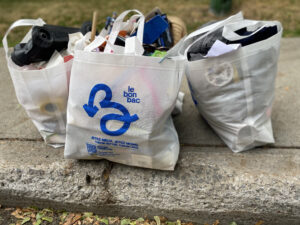 Activating a secondary supplier and pivoting to an alternate bag for the first half of the pilot set things to rights. Le Bon Bac took care to ensure these alternate bags were reusable and recyclable through one of their existing partners and seamlessly transitioned to the original sugarcane ethanol bags once they arrived. All without disrupting service or compromising on environmental goals.
Activating a secondary supplier and pivoting to an alternate bag for the first half of the pilot set things to rights. Le Bon Bac took care to ensure these alternate bags were reusable and recyclable through one of their existing partners and seamlessly transitioned to the original sugarcane ethanol bags once they arrived. All without disrupting service or compromising on environmental goals.
When all the planning, backup planning, bagging and sorting was done, the pilot had successfully diverted 441 kg of hard-to-recycle materials from landfill with over 99% of collected materials transformed into high-quality, non-contaminated circular products.
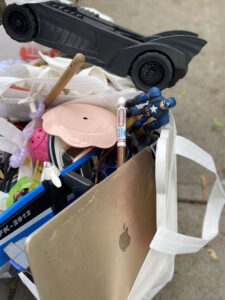 Textiles and shoes were upcycled into reusable fabrics or repaired and resold, electronics and batteries were safely dismantled and recycled with full traceability, and office supplies and toys were repurposed into industrial-grade plastic pellets. Everything from corks to chopsticks, tennis balls to eyewear was redirected to specialized partners for reuse or transformation. Even paints were recycled into new products or safely treated.
Textiles and shoes were upcycled into reusable fabrics or repaired and resold, electronics and batteries were safely dismantled and recycled with full traceability, and office supplies and toys were repurposed into industrial-grade plastic pellets. Everything from corks to chopsticks, tennis balls to eyewear was redirected to specialized partners for reuse or transformation. Even paints were recycled into new products or safely treated.
All this processing was done locally, minimizing transportation emissions and supporting Canadian circular economy infrastructure.
Feedback from participants was extremely positive, with many opting to become paying customers post-pilot. The pilot also generated organic interest from businesses and institutions, including with offices seeking employee collection bins and companies exploring tailored solutions for specific waste streams like textile offcuts.
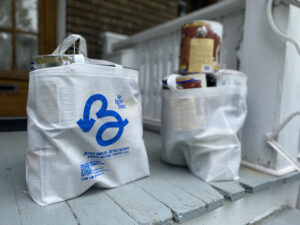 Le Bon Bac is helping shift how urban households think about waste. By placing education at the heart of their service, they’re empowering citizens to take part in the zero-waste movement—making recycling more understandable, accessible, and actionable.
Le Bon Bac is helping shift how urban households think about waste. By placing education at the heart of their service, they’re empowering citizens to take part in the zero-waste movement—making recycling more understandable, accessible, and actionable.
In service of this, Le Bon Bac built a collaborative ecosystem of mission-aligned partners—from social enterprises to specialized recyclers—that work together to create lasting impact. Their model connects people and organizations around shared values of sustainability, inclusion, and transparency.
Today, their doorstep collection service offers a practical, transparent solution for hard-to-recycle materials. Designed to complement public systems and built on a repeatable framework that’s already being adapted for other cities, the Le Bon Banc model is bagged up, ready to take the hassle and confusion of recycling to the curb nationwide.













